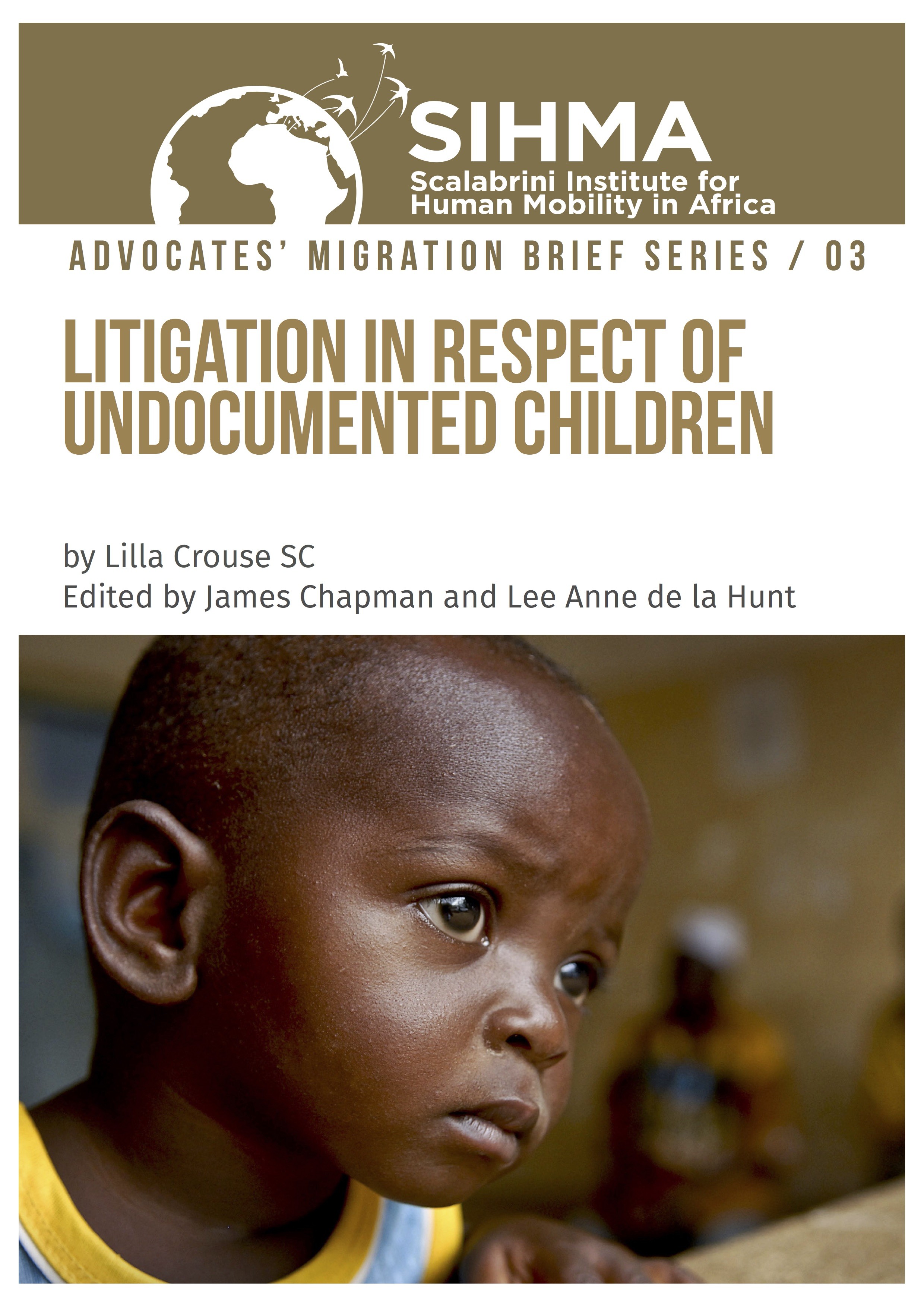
Advocates’ Migration Brief - Litigation in respect of Undocumented Children
SIHMA’s research paper series entitled the Advocates’ Migration Brief sees its third iteration as the series addresses recent judicial decisions relating to people on the move from the perspective of Court Advocates. The third article in the series is entitled “Litigation in respect of Undocumented Children” and is an interesting read on the hardship undocumented children are experiencing in South Africa [1]. It is estimated that the country is home to almost 1 million undocumented children [5]. Many of these children are migrants or refugees, but there are a number children with South African parents who are also undocumented.
A position paper presented by The South African Human Rights Commission (SAHRC) in 2019, estimates that 5% of all births in the country are not being registered [3]. The reasons for this are often related to poverty or difficulties of parents to meet the birth registration requirements [4].
The challenges many undocumented children face include difficulties accessing services like healthcare and schooling, the risk of statelessness, detention, and deportation [4], as well as human trafficking, sexual exploitation, and child labour [3]. The negative impact this can have on a child’s life makes them a vulnerable group in society.
The article gives us a good understanding of some of these challenges by telling the stories of three cases regarding undocumented children in South Africa. The author, Advocate Lilla Crouse SC, was involved in each case as counsel and points out that these cases by no means are unique in the country [1].
The cases are built on a legal framework based on the Constitution, as well as the customary international laws and conventions South Africa is bound by [1]. The Children’s Act 38 and the South African Citizenship Act 88 are also of relevance in these cases [1].
According to both national and international law, all organs of state are obliged to ensure the rights of all children, including those without documentation [2]. However, this is not the reality for many undocumented children in South Africa. Several constitutional rights have been infringed in each case discussed by the author, and the Department of Home Affairs (DHA) is proving to be a challenge to the documenting of children [1].
The first case in the article involves a baby born in South Africa to a mother who was illegally in the country. Neither of the baby’s parents were South African and the only documentation she was given at birth was a hand-written birth certificate. The mother left her baby in the hospital and she was taken care of by foster parents who eventually wanted to adopt her. This turned out to be a long and hard process with the DHA because of the lack of documentation.
The second case involved two siblings with a mother who had obtained an asylum seeker status in South Africa. The oldest child was given a status as dependant, while the youngest child was born in South Africa and had a hand-written birth certificate. After their mother’s death, the children could not be sent to a children’s home due to their lack of official documentation. The children were now stateless and institutionalised. Again, receiving help from the DHA was a challenge. The case ended up in the High Court, and despite the DHA’s attempts to fight the court orders, the youngest child was found to be South African by birth and the oldest child was documented as a permanent resident.
The third and last case of the article is about undocumented children in a rural area in South Africa which were denied schooling. Most of these children had at least one South African parent. According to the Citizenship Act, all children with a South African citizen as parent, are South African by birth [1]. The DHA violated these children’s constitutional right to citizenship and was once again reluctant to help and ignored court orders.
The DHA has through these cases referred to outdated legislation, not worked in compliance with the law, and ignored court orders. Thus, the article gives a compelling argument that the DHA has not fulfilled their obligations to make sure that undocumented children are being taken care of in accordance with South African and international law.
James Chapman and Victoria Jensen
SIHMA SIHMA
Project Manager Research and Communications Intern
SOURCES:
- Advocates Migration Brief, Article 3 (2021). Litigation in respect of Undocumented Children by Advocate Lilla Crouse SC. Retrieved from: https://sihma.org.za/advocates-migration-brief/litigation-in-respect-of-undocumented-children
- South African Government. (2020, 14 December). Minister Lindiwe Zulu launches R19 Million Programme to protect unaccompanied and undocumented children. Retrieved from: https://www.gov.za/speeches/unaccompanied-and-undocumented%C2%A0children%C2%A0-14-dec-2020-0000
- The South African Human Rights Commission. (2019). Access to a Basic Education for Undocumented Learners in South Africa. Retrieved from: (https://sahrc.org.za/home/21/files/SAHRC%20Position%20Paper%20on%20Access%20to%20a%20Basic%20Education%20for%20Undocumented%20Learners%20in%20South%20Africa%20-%2012092019.pdf
- Scalabrini. (2018, 14 August). The impact of being an undocumented child. Retrieved from: https://www.scalabrini.org.za/news/the-impact-of-being-an-undocumented-child/
- Cassette, J. & Erasmus, T. (2020, 29 January). Eastern Cape High Court hands down ground breaking judgement on the right to basic education. Retrieved from: https://www.cliffedekkerhofmeyr.com/en/news/publications/2020/probono/probono-alert-29-january-Eastern-Cape-High-Court-hands-down-ground-breaking-judgment-on-the-right-to-basic-education.html
Categories:
Tags:

